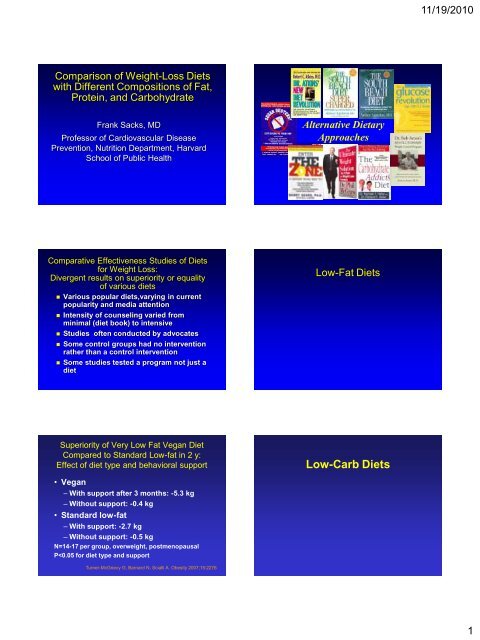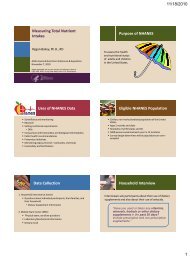THE DASH-SODIUM TRIAL - FNCE
THE DASH-SODIUM TRIAL - FNCE
THE DASH-SODIUM TRIAL - FNCE
- No tags were found...
Create successful ePaper yourself
Turn your PDF publications into a flip-book with our unique Google optimized e-Paper software.
11/19/2010Comparison of Weight-Loss Dietswith Different Compositions of Fat,Protein, and CarbohydrateFrank Sacks, MDProfessor of Cardiovascular DiseasePrevention, Nutrition Department, HarvardSchool of Public HealthAlternative DietaryApproachesComparative Effectiveness Studies of Dietsfor Weight Loss:Divergent results on superiority or equalityof various diets• Various popular diets,varying in currentpopularity and media attention• Intensity of counseling varied fromminimal (diet book) to intensive• Studies often conducted by advocates• Some control groups had no interventionrather than a control intervention• Some studies tested a program not just adietLow-Fat DietsSuperiority of Very Low Fat Vegan DietCompared to Standard Low-fat in 2 y:Effect of diet type and behavioral support• Vegan– With support after 3 months: -5.3 kg– Without support: -0.4 kg• Standard low-fat– With support: -2.7 kg– Without support: -0.5 kgN=14-17 per group, overweight, postmenopausalP
Change in Weight (%)11/19/2010Low-Carb Diet vs Low-FatDiet for Weight LossConventional Diet vsAtkins Low Carbohydrate Diet0-4P = .001P = .02NS-8Stern L…Samaha F. Ann Intern Med 2004;140:769-120 3 69 12MonthFoster GD, et al. N Engl J Med. 2003;348:2082-2090.Marginally Better Result with Low-Carb Compared to Calorie Control orVery Low-fatNo Long-term Advantage ofAtkins Diet vs Low-FatGardner C. et al. JAMA 2007Foster GD et al. Ann Intern Med 2010;153:147More Adverse Effects ofLow-Carb Atkins vs Low-Fat• Foster G et al. Ann Intern Med 2010– More bad breath, constipation, dry mouth• Yancy WS et al. Ann Intern Med 2004– More bad breath, constipation, headache,myalgia, rash, weaknessSuperiority of Mediterranean and Low-Carbcompared to Low-fatWeight lossphaseWeight loss maintenance phase-2.9 (-3.3)-4.4 (-4.6)-4.7 (-5.5)Shai I, … Stampfer M. NEJM 20082
Weight Change (Lbs.)11/19/2010Superiority of High-Unsaturated Fat,Mediterranean-style diet for weight lossBaseline 6 Months 12 180 0-5-10-15-14-13MediterraneanLow Fat-11-6-12 -11Weight Gain in the Dropouts:Mediterranean and Low-FatGroups Combined• Dropouts had a net gain in weight of9 pounds from the starting weightafter 18 months.• Those staying in the program lost 11pounds.McManus, Antinoro, Sacks. Int J Obesity 2001;25: 1503-11Interpretation of Comparative WeightLoss Trials• Divergent results among studies• Each diet type showed superiority overother types in certain trials.• No obvious pattern of results favoring aspecific fat, carb or protein content forweight loss.• Superiority of a diet type in the first 6months often not sustained by 1 to 2 y.Limitations of Some ComparativeTrials of Diet Types and Weight Loss• Large percentage of dropouts, up to 50%• Novelty of one of the diets, mediaattention, and its marketing may haveaffected expectations of success.• Equipoise may not have been achieved;researchers may have subtly favored adiet.PoundsLost Trial: Design• 811 overweight or obese people in Boston(Harvard School of Public Health) and BatonRouge (Pennington Biomedical ResearchCenter, LSU System)• Randomization among 4 diet types• Duration of treatment 2 years• Primary Outcome: Body weight, changefrom baseline to 2 years.• Secondary Outcome: Waist Circumference• Primary Analysis: Intention-to-treat withimputation of missing outcome data.• Secondary Analysis: Completers (80%)PoundsLost Trial: DietsThese diets with target nutrient levels:1. Low-fat (20%), average protein (15%), highestcarbohydrate (65%)2. Low-fat (20%), high protein (25%),carbohydrate (55%)3. High fat (40%), average protein (15%),carbohydrate (45%)4. High fat (40%), high protein (25%), lowestcarbohydrate (35%)Similar foods used for all diets but in differentproportions. All dietary approaches adhered tohealthful guidelines to prevent cardiovascular disease.3
11/19/2010Achievement of Specific Weight Loss, 2y(Post-hoc Analysis)Carbohydrate/Protein/Fat, Target Intake, % Kcal65/15/20 55/25/20 45/15/40 35/25/40• Number 204 202 204 201• >5% initial 30% 39% 31% 36%• >10% initial 14% 15% 16% 14%• >20 kg 4% 4% 2.5% 2%• 90 th p’tile 11.3 kg 12.3 kg 12.9 kg 10.9 kgContinued Weight Loss: from 6months to 2 years• 23% lost weight after 6 months• Mean additional weight loss = 3.6 kg• Total weight loss = 9.3 kg• No differences among the dietsNo significant differences by dietSatiety, Diet Satisfaction: Participants’reports at 6 months and 2 yearsGroup Session Attendance andWeight Loss at 2 years: Total Group= 0.2 kg per session attended• Satiety by visual analogue scales• Diet Satisfaction (Urban 1992)• Food Craving: fats, sweets, carbohydrates,fast food fats, fruits & veg (FCI-II)• Dietary restraint, disinhibition, hunger (ThreeFactor Eating Questionnaire, White M 2002)• Quality of Life (SF-36)No significant differences by diet groupSacks FM, 2009.Group Session Attendance and WeightLoss: Similar in each diet groupAve Prot, Low-FatSlope = -0.18 kg/sessionAve Prot, High-FatSlope = -0.25 kg/sessionHigh Prot, Low-FatSlope = -0.19 kg/sessionHigh Prot, High-FatSlope = -0.22 kg/sessionWeight Loss:Therapeutic Techniques• “Self-help” vs Weight Watchers, 2 years– Self-help: 2 dietitian consultations• Weight Loss = 0.5 pounds– Weight Watchers: weekly meetings• Weight Loss = 6.4 pounds overall, 11pounds in good attenders• Internet behavioral “e-counseling”– 10 pound weight loss at 1 yearHeshka S et al; Tate D et al. JAMA, April 9, 20035
11/19/2010Metabolic Sydrome• Prevalence at baseline: 32%• Reduced to 20% after 2 years• No differences among the dietsConclusion• Successful diets for weight loss can emphasize alarge range of macronutrient intakes.• These diets are made with foods that reduce riskof cardiovascular disease.• Serum lipids and insulin are improved on all suchdiets. But low-fat may not be best for metabolicsyndrome or diabetes.• Ongoing counseling sessions are important toachieve and maintain weight loss in all groups.• Successful diets for weight loss can be tailored toindividual patients’ personal and culturalpreferences to achieve long-term success.PoundsLost Trial Organization:Study Sites, Researchers, Funding• Harvard School of Public Health and Brigham &Women’s Hospital, Boston; F. Sacks, PI, StudyChairperson; Kathy McManus, Meryl LeBoff• Pennington Biomedical Research Center, LouisianaState University System, Baton Rouge, G. Bray PI;Donna Ryan, Steven Smith, Steven Anton, DonWilliamson, Cathy Champagne, Jennifer Rood• Coordinating Center: Channing Laboratory, Brigham &Women’s Hospital, V Carey Director; N Laranjo• National Heart Lung and Blood Institute, NIH; CayLoria, Eva Obarzanek, Project Officers• Investigator Initiated proposal to NHLBI funded bycooperative agreement grant to Harvard School ofPublic Heath.6








